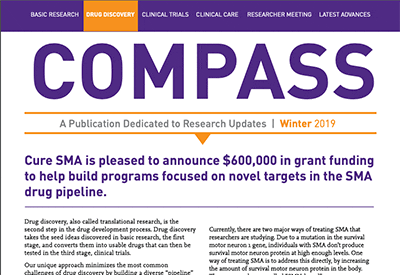Cytokinetics, Incorporated and Astellas Pharma Inc. today provided an update for their collaborative skeletal muscle program, including clinical trial updates for reldesemtiv in SMA.
In June, Cytokinetics announced data from a Phase 2 double-blind, randomized, placebo-controlled clinical study in patients with SMA which was designed to determine potential pharmacodynamic effects of a suspension formulation of reldesemtiv following 8 weeks of oral dosing in each of two cohorts of 36 patients with Type II, Type III, or Type IV disease. Secondary objectives were to evaluate the safety, tolerability and pharmacokinetics of reldesemtiv. The study showed statistically significant concentration-dependent increases in changes from baseline in Six Minute Walk Distance (6MWD), a sub-maximal exercise test of aerobic capacity and endurance.
The study also showed statistically significant increases for Maximal Expiratory Pressure (MEP), a measure of strength of respiratory muscles. Other assessments, including the Hammersmith Functional Motor Score – Extended, (a functional motor scale that was assessed in the development program that led to the FDA approval of the first therapy for patients with SMA), Revised Upper Limb Module, Timed Up-and-Go, Forced Vital Capacity, and the SMA Health Index (SMA-HI), a patient reported outcome measure (PROM) developed to comply with FDA standards for PROMs, did not demonstrate differences between reldesemtiv versus placebo. Adverse events were similar between groups receiving reldesemtiv and placebo.
Additional results presented at the 2018 Muscle Study Group Scientific Meeting in Oxford, U.K., showed sustained increases in 6MWD and MEP four weeks after discontinuation of study drug (i.e., Follow-up). The mean increase versus placebo in the change from baseline in 6MWD on 450 mg twice daily was 24.89 m after 8 weeks of treatment (p = 0.0584) and 30.81 m at Follow-up (p = 0.0381). Similarly, the mean increase versus placebo in the change from baseline in MEP on 450 mg twice daily was 13.15 cm H2O after 8 weeks of treatment (p = 0.0298) and 9.47 cm H2O at Follow-up (p = 0.1344).
A post-hoc analysis also showed that changes from baseline in the 6MWD at 450 mg twice daily were significantly correlated with changes from baseline on certain domains of the SMA-HI intended to reflect improved endurance, especially Fatigue (correlation coefficient [r] = -0.90, p = 0.01) and Activity Participation (r = -0.82, p = 0.05). Of note, decreases in SMA-HI scores reflect reduced disease burden as measured by that PROM; therefore, the negative correlation coefficients indicate that as 6MWD increases, disease burden assessed by that domain of the SMA-HI is reduced.
Cytokinetics recently convened an expert advisor meeting to discuss the Phase 2 clinical study of reldesemtiv in patients with SMA and received encouraging and constructive feedback as well as recommendations to inform potential next steps.
Cytokinetics will be seeking a Type C regulatory interaction with the FDA this year regarding the acceptability of 6MWD as an endpoint for a potential registration program for reldesemtiv in patients with SMA.
Cure SMA Funding for Combination Therapies
The clinical trials for CK-2127107 (reldesemtiv) came about because of early seed funding from Cure SMA, supporting research focused on the potential application of these types of skeletal muscle activators to SMA. In 2014, Cytokinetics released encouraging data from preclinical studies conducted with our funding. The data showed this approach had positive effects in preserving muscle strength and reducing muscle fatigue, setting the groundwork for the ongoing clinical trials.
The progress of this program also highlights the importance of developing combination therapies to treat SMA. The goal is that CK-2127107 will show positive results in preserving muscle strength in human clinical trials and may lend itself to combination with other SMA therapies, particularly those that address the SMN protein deficiency caused by the SMN1 mutation.



